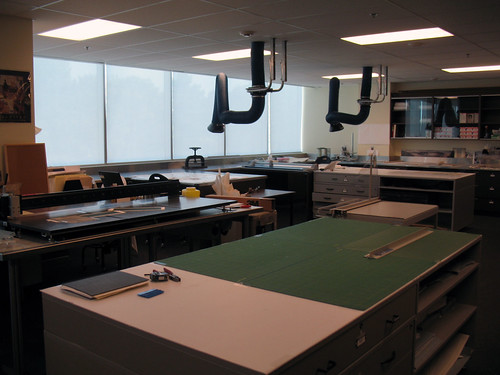appreciating archives
 |
| Conservation lab at the Archives of Ontario. Photo taken during a Doors Open tour in 2010. |
Plug in the laptop. Attach the cooling pad to ensure the
computer resists self-immolation. Wait for research materials to arrive, or
start in on an order placed ahead of time. If waiting, sign on to the internet,
work on other projects, or grab a pencil (no pens allowed!) and scribble random
thoughts on scrap paper or in a notebook. When the boxes and file folders
arrive, dive headfirst into the past.
Yep, just another day researching in an archive.
***
I love working in archives. Flipping through holdings brings
forward the same feelings of discovery I had as a student while working with my
father’s archival-sized collection of newspaper clippings. In both cases,
beyond gathering the information required for the project at hand, I enjoy
stumbling upon odd, unrelated tidbits. These side findings are good for a
laugh, for shock value, and for inspiring future articles. Anything that pushes
the wheels in my head is a bonus.
Each archive has its own character. Size wise, work
spaces I’ve utilized in Toronto range from the roomy research hall at the City of Toronto Archives to the cozy, residential setting of the Canadian Lesbian and Gay Archives. The D.K. “Doc” Seaman Hockey Resources Centre is attached to
an arena in Etobicoke, so it’s possible to catch some shinny when your work is
done. Out in Scarborough, I’ve worked amid a collection of century-old musical
instruments at the Salvation Army’s archives. Just today, I made my first visit
to the Ontario Jewish Archives, a collection whose slightly hidden location
within a large North York complex enhances the treasure hunt atmosphere.
The archives I’ve mentioned are only a small sampling of the
historical records sources available in the city. The internet has widened
exposure of collections large and small—beyond posting archival documents and
photos, archive websites allow better preparation for visits by allowing you
order materials before dropping in. The time savings hit me when I forgot to
place an order before my first visit to the Thomas Fisher Rare Book Library,
resulting in an hour-and-an-half to kill before my materials were scheduled for
delivery.
Staff is a critical asset. Archivists and their associates
will answer your questions regardless of how bizarre they might seem. They’ll
hunt far beyond your initial request and deliver material from sources (or suggest
search terms) you hadn’t considered, or something will spark their memory of a
deeply-buried item suited to your quest.

Comments